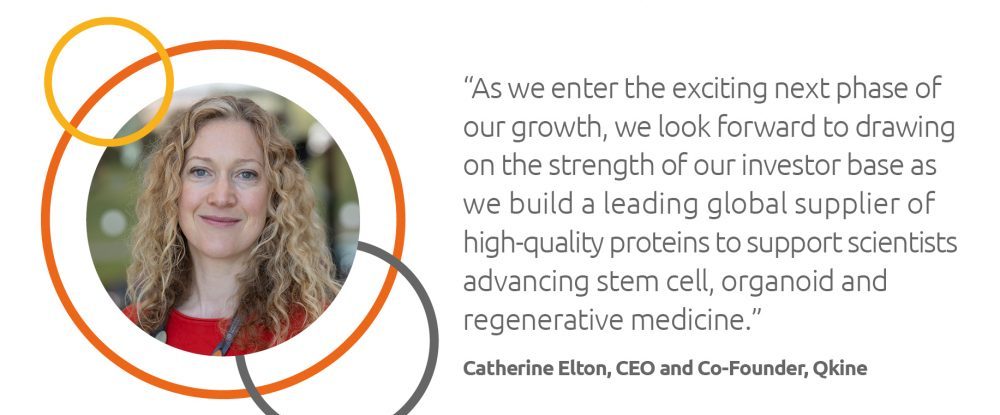Qkine secures £1.5M series A funding from leading life science investors

Cambridge, UK 08 June 2020: Qkine – a specialist developer and manufacturer of proteins for stem cell, organoid and regenerative medicine applications – today announced the successful closure of a £1.5M series A investment round to accelerate the global scale-up of its commercial operations and make key hires to its leadership team. The funding round attracted support from a wealth of leading life science funds and angel investors, including Parkwalk, a London-based firm that backs world-changing technologies emerging from the UK’s leading universities, who led the round; Jonathan Milner, serial entrepreneur and founder of Abcam; Martlet Capital, a Cambridge-based investor with a growing portfolio of innovative life science companies; and the fast-growing o2h ventures Human Health EIS fund.
As a result of Qkine’s success to date and ever-increasing customer base, the company has also secured investment from its existing supporters, including Cambridge Enterprise and other angel investors, to complete the round.
Re-defining industry standards for growth factor and cytokine biochemical quality
Spun out from the University of Cambridge in 2016, Qkine is re-defining industry standards for growth factor and cytokine biochemical quality to enable more reproducible and cost-effective scaling of stem cell, organoid and regenerative medicine applications. Qkine develops and manufactures highly pure, recombinant growth factors, cytokines and other bioactive proteins using proprietary protein engineering and refolding technology developed by Dr Marko Hyvönen, Qkine Co-Founder and CSO. With few primary manufacturers of these complex bioactive proteins, Qkine’s very stringent purity and bioactivity criteria help to strengthen the supply chain for stem cell research, biotechnology and drug discovery assays. In parallel, Qkine is applying its innovative protein engineering techniques to develop highly optimised forms of key proteins, helping to overcome core industry challenges such as protein stability and reproducibility of cell culture. This will enable the scaling of innovative stem cell and organoid systems for applications including precision medicine, toxicology screening and tissue engineering.
Global scale-up of commercial operations and key hires to leadership team
Qkine’s protein expertise and high-quality products have already attracted a loyal customer following from both leading biotech and pharmaceutical organisations, as well as world-class academic institutions. The successful completion of this series A investment round will enable the next phase of Qkine’s growth, including the roll out of full commercial operations across East Asia, the US and Europe, as well as its expansion into new markets, such as Scandinavia. In addition, the funding will be used to make key appointments to strengthen Qkine’s leadership team and accelerate the company’s scale-up and expansion of its product portfolio.
Alastair Kilgour, Chief Investment Officer, Parkwalk commented: “There is a clear market need for high-quality protein reagents, especially for applications in stem cell biology and organoid research. Qkine has both a compelling technology to meet this need and a highly experienced management team to drive the growth of the business.”
Dr Catherine Elton, CEO and Co-Founder, Qkine added: “Given the challenging circumstances that our industry is currently facing in light of the coronavirus pandemic, we are delighted by the proactive and overwhelming support that we – a UK-based life science manufacturing company – have received from both our existing and new investors. This is not only a testament to the company’s success to date but also highlights the critical need for improving growth factor and cytokine quality within the industry. As we enter the exciting next phase of our growth, we look forward to drawing on the strength of our investor base as we build a leading global supplier of high-quality proteins to support scientists advancing stem cell, organoid and regenerative medicine.”




